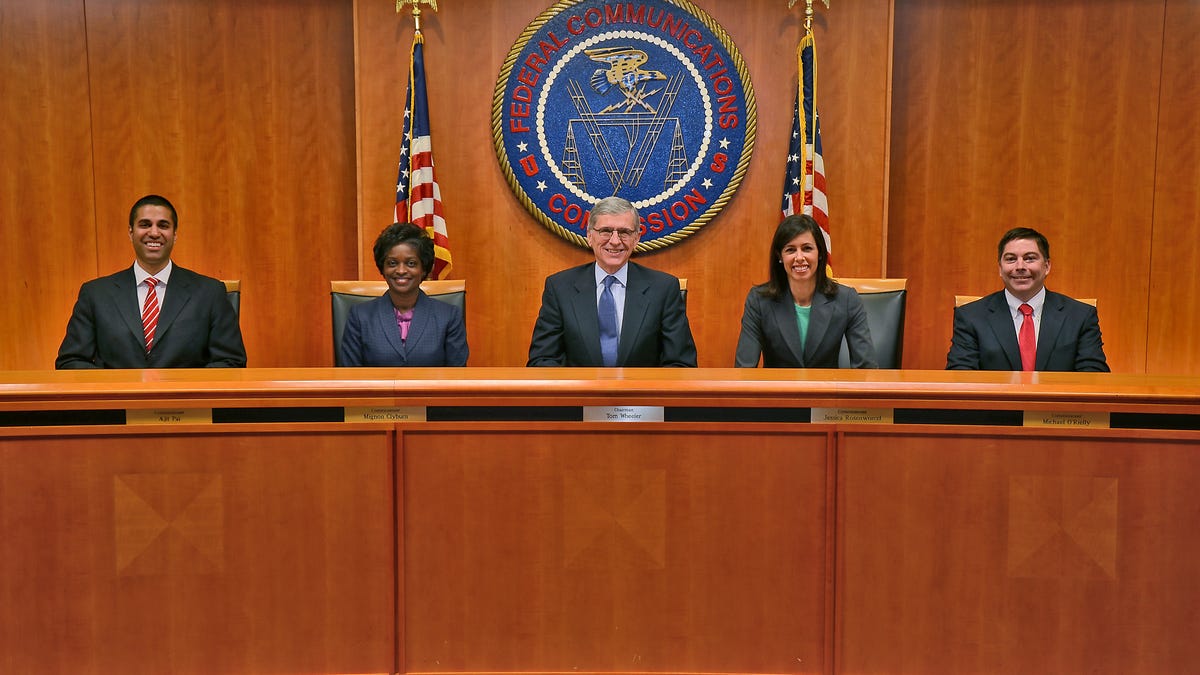FCC hits brakes on set-top box vote
Democrats on the Federal Communications Commission say they'll wait to consider rules requiring cable companies to create apps that could replace set-top boxes.

The FCC commissioners (left to right): Ajit Pai, Mignon Clyburn, Tom Wheeler (chairman), Jessica Rosenworcel and Michael O'Rielly.
New government rules that are meant to free consumers from set-top box rental fees have been put on hold.
The Federal Communications Commission said Thursday it will wait to vote on the controversial proposal, which Chairman Tom Wheeler has said will help consumers cut their cable bills. Democrats on the FCC said they are still committed to "unlocking the set-top box for consumers," but that details of the proposal need to be hashed out.
"We have made tremendous progress, and we share the goal of creating a more innovative and inexpensive market for these consumer devices," Chairman Wheeler and Commissioners Mignon Clyburn and Jessica Rosenworcel said in a statement. "[But] we are still working to resolve the remaining technical and legal issues."
The delay for the new rules come as lawmakers, content companies like Disney and Time Warner, and the pay-TV industry, which includes cable giants such as Comcast, have urged the FCC to delay the vote to give all stakeholders more time to review a revised proposal introduced earlier this month.
"We are pleased that the FCC has chosen to delay consideration of its set-top box item, and hope that additional time will lead to meaningful public review and comment on any newly-crafted proposal under consideration," the top cable industry association NCTA said in a statement.
The FCC's original "Unlock the Box" proposal, introduced in February, had been pitched as a way to give consumers cheaper and more innovative alternatives to the set-top boxes available from their cable companies. Today, 99 percent of pay-TV subscribers rent set-top boxes and spend an average of $231 a year to lease these devices, according to a congressional study.
Critics, such as the cable companies and Roku, a maker of streaming-video devices, argued an FCC mandate on set-top boxes could add costs, threaten consumer privacy and hurt smaller content producers.
The FCC announced a revised proposal in early September, which would mandate all pay-TV providers offer an app on devices like a Roku, Apple TV, Xbox One, smart TVs, or iOS and Android phones or tablets. The proposal also requires that cable operators and other companies offering pay-TV service integrate search for their programming with content found through apps, like Hulu and Netflix, so that consumers can search across apps for TV shows and movies.
Critics say the new proposal could still give the FCC too much involvement in licensing programming.
More than 60 Democrats in the House signed a letter sent to the FCC last week asking the agency to remove the item from its agenda and publish the full proposal of revised rules to get more public input.
"It is difficult to analyze the full scope of the standard license and the FCC's role in developing and enforcing this license without knowing the full details of the proposal," the letter reads.
Rosenworcel expressed concern with the proposal at a Senate hearing earlier this month, indicating that if the vote had gone forward the rules may not have passed. The FCC's two Republicans also oppose the proposal. Three votes on the five-member commission are needed to pass a measure.
The FCC didn't indicate when the new rules will be back on the agenda for a vote.

